SUMMARY
This is AI generated summarization, which may have errors. For context, always refer to the full article.
- Asset bubbles in PH? IMF is watching
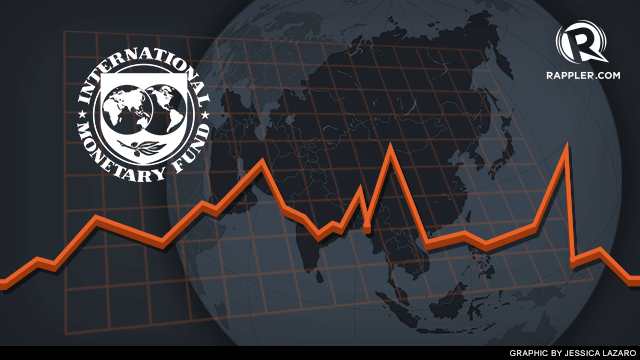
The eastward tilt of large funds into the stock and property markets of the Philippines, Indonesia, Thailand, Hong Kong and other Asian markets is being closely watched by the International Monetary Fund (IMF). The multilateral lender, which stepped in when the region suffered asset bubbles during the Asian financial crisis in the 1990’s, said this time, the inflows have been generally “not been excessive so far” but could reach levels difficult to manage. The Philippine stock market has been soaring over 20% year-to-date and placed No. 5 in CNN’s Best Stock Markets, while construction of new condominiums, offices, malls, and townships have kept Metro Manila humming.
Read the full story on Rappler
View CNN’s World’s Hottest Stock Markets map - PH stands to win, lose when ASEAN becomes one

As Filipino businessmen mull the impact of one Asean economic community less than two years from now, the line between winners who have prepared and losers who say they did not receive government support is clearer. At the April 29 meeting of the Management Association of the Philippines, the tourism sector and the banking community will most likely be ready to tap the opportunities of a single regional market by 2015. Among those falling behind may include manufacturing, a sector that did not receive support among leaders fighting for political survival in the past.
Read the full story on Rappler - Senate bets jump, fall big time in new survey

With less than a month to go before the polls, 5 senatorial saw their numbers plunged in a new survey. The April 20-22 Pulse Asia survey showed that re-electionist senators Aquilino “Koko” Pimentel III, Gregorio Honasan II, Alan Peter Cayetano and candidates Jack Enrile and Nancy Binay suffered the biggest fall in the “voting preference.” Former censors chief Grace Poe, previously at 4th to 10th place, now occupies the 3rd to 4th spot, while Risa Hontiveros and Ramon “Jun” Magsaysay make it to winning list. Re-electionists Loren Legarda and Francis Escudero tied in 1st-2nd place. The survey showed an 11-5 combination for the administration Team PNoy and the opposition United Nationalist Alliance (UNA).
Read the full story on Rappler - Malaysia Watch: UMNO, Pakatan Rakyat in tight race
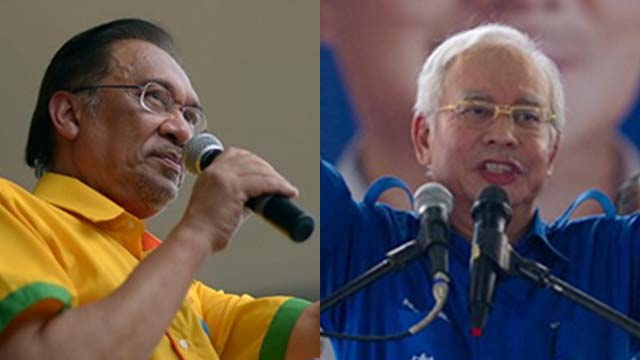
Malaysia is bracing for its closest general election ever. On May 5, when voters cast ballots, it will be the first time in the country’s history that they do so without knowing the eventual winner. The ruling coalition headed by the United Malays National Organisation (UMNO) is among the world’s longest-serving governments, unbeaten since independence in 1957 thanks to decades of economic growth and authoritarian rule. But the rising Pakatan Rakyat (People’s Pact) opposition alliance has tapped into UMNO fatigue with promises to end authoritarianism and corruption, and many observers say the vote is hard to predict.The stakes are high for both sides. A loss by UMNO’s Barisan Nasional ruling coalition threatens a Malay elite accustomed to political dominance and its rich business perks.
Read the full story on Rappler - Some Senate bets are World War, Martial Law babies
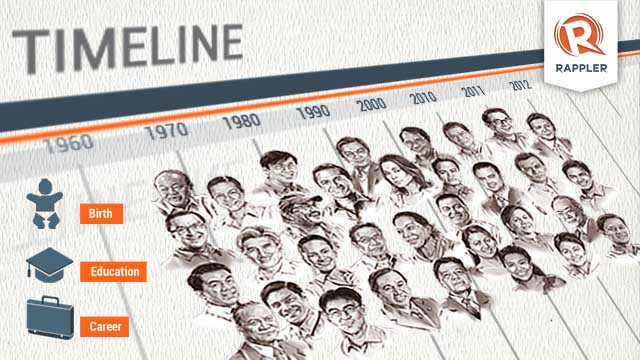
In an interactive trivia, Rappler maps out the May 2013 Senate bets’ age gaps (ranging from 78 to 35), birthplace (22 were born in Metro Manila), and the different political, historical and social milestones the candidates were exposed to as they became or aspire to become lawmakers. For example, 4 of the candidates were already born when the Japanese attacked the Philippines during World War II; 5 candidates are Martial Law babies, and 14 finished college after the Edsa Revolution in 1986. Explore the interactive timeline and find out more about the candidates.
View the interactive timeline on Rappler - Amsterdam turns orange to welcome first king since 1890

Amsterdam prepares to paint the town orange ahead of the enthronement of king Willem-Alexander, with millions across The Netherlands geared up to say farewell to a much-adored queen after 33 years. Willem-Alexander will become the first male monarch of the Netherlands since 1890. The Dutch royal family is known as the House of Orange-Nassau, so it is hardly surprising souvenir shops are seeing a roaring trade in anything in the national color. The 600-year-old Nieuwe Kerk church is the scene of Willem-Alexander’s investiture as the first Dutch king in more than 120 years following the earlier abdication of his mother, Queen Beatrix. Government and noble guests prepare for the ceremonies, and the Dutch get ready for a huge party.
Read more on Rappler here and here - What permit? Rebel group denies extortion
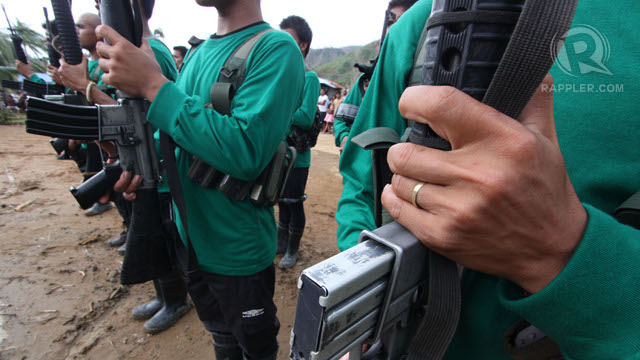
Local candidates are “coordinating and cooperating” with the Communist Party of the Philippines (CPP), and are “not coerced” to pay the so-called Permit to Campaign (PTC) in areas influenced by the revolutionary movement. This was the newest statement of the rebel group amid violence committed against some local bets campaigning in areas that CPP’s armed unit, the New People’s Army (NPA), claim as their “territories” in Mindanao. For politicians who fail to follow the policies of the revolutionary movement, however, they would face military enforcement from the NPA, the CPP said. Maj Gen Jose Mabanta, chief of the military’s 3rd Infantry Division, earlier divulged that half of the political contenders in his area are buying protection from the NPA.
Read more on Rappler. - Brazil priest supporting gays excommunicated

A Catholic priest in southeastern Brazil was excommunicated on April 29 after publicly resigning from his duties to protest against the church’s opposition to homosexuality. The diocese of Sao Paolo said in a statement Father Roberto Francisco Daniel can no longer celebrate the divine rite. The 48-year-old priest, who renounced his church duties over the weekend, was accused of “heresy” and “schism” by the church hierarchy in the world’s biggest Catholic country, which will welcome Pope Francis in late July during a major youth festival in Rio de Janeiro.
Read the full story on Rappler - CIA ‘pays’ Afghan’s Karzai to win influence: report
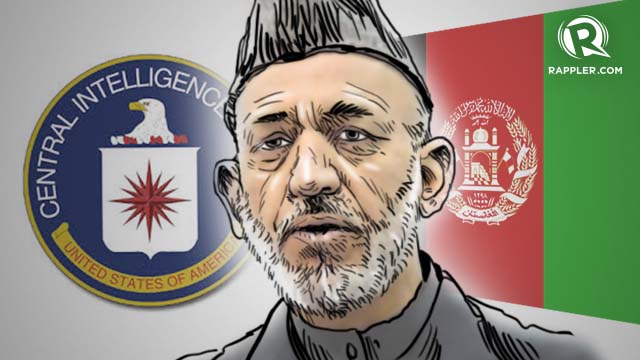
Afghan President Hamid Karzai confirmed on April 29 that his office has received money from the US Central Intelligence Agency (CIA) over the past decade, with wads of cash reportedly handed over in suitcases and backpacks. Karzai thanked the US spy agency for what he said was money well spent just hours after The New York Times reported that Karzai’s office received tens of millions of dollars in cash in a CIA effort to win influence. He said the money had been used for good causes in Afghanistan, where endemic corruption has undermined efforts to establish a stable state, more than 11 years after the US-led invasion to dislodge the Taliban.
Read the full story on Rappler - How Zuckerberg learned from bad decisions
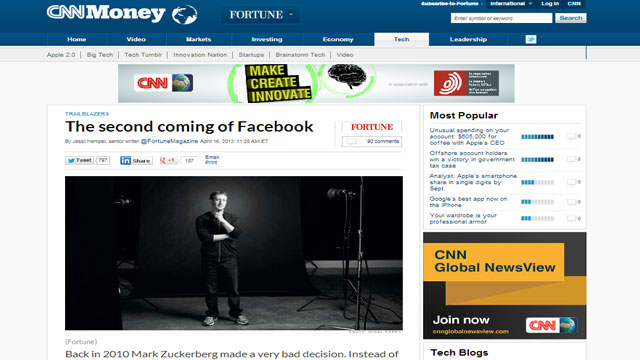
Mark Zuckerberg made a very bad decision in 2010: He focused Facebook’s engineers on designing an app version of Facebook that could operate on any smartphone, betting that standalone mobile apps would go away. They didn’t. The buggy and slow Facebook app soon became “one of the biggest mistakes we’ve ever made,” Zuckerberg said in a Fortune magazine cover story where he admitted that he was concerned about being among hundreds of Silicon Valley success stories that failed to catch the next wave and died. He and his lieutenants then made sweeping structural and cultural changes — moves that often went against his instincts — including embed mobile engineers in all product teams. In early April, Zuckerberg introduced Facebook Home, a new way to provide its customers with a rich Facebook experience on mobile phones.
Read the full story on Fortune
Add a comment
How does this make you feel?
There are no comments yet. Add your comment to start the conversation.